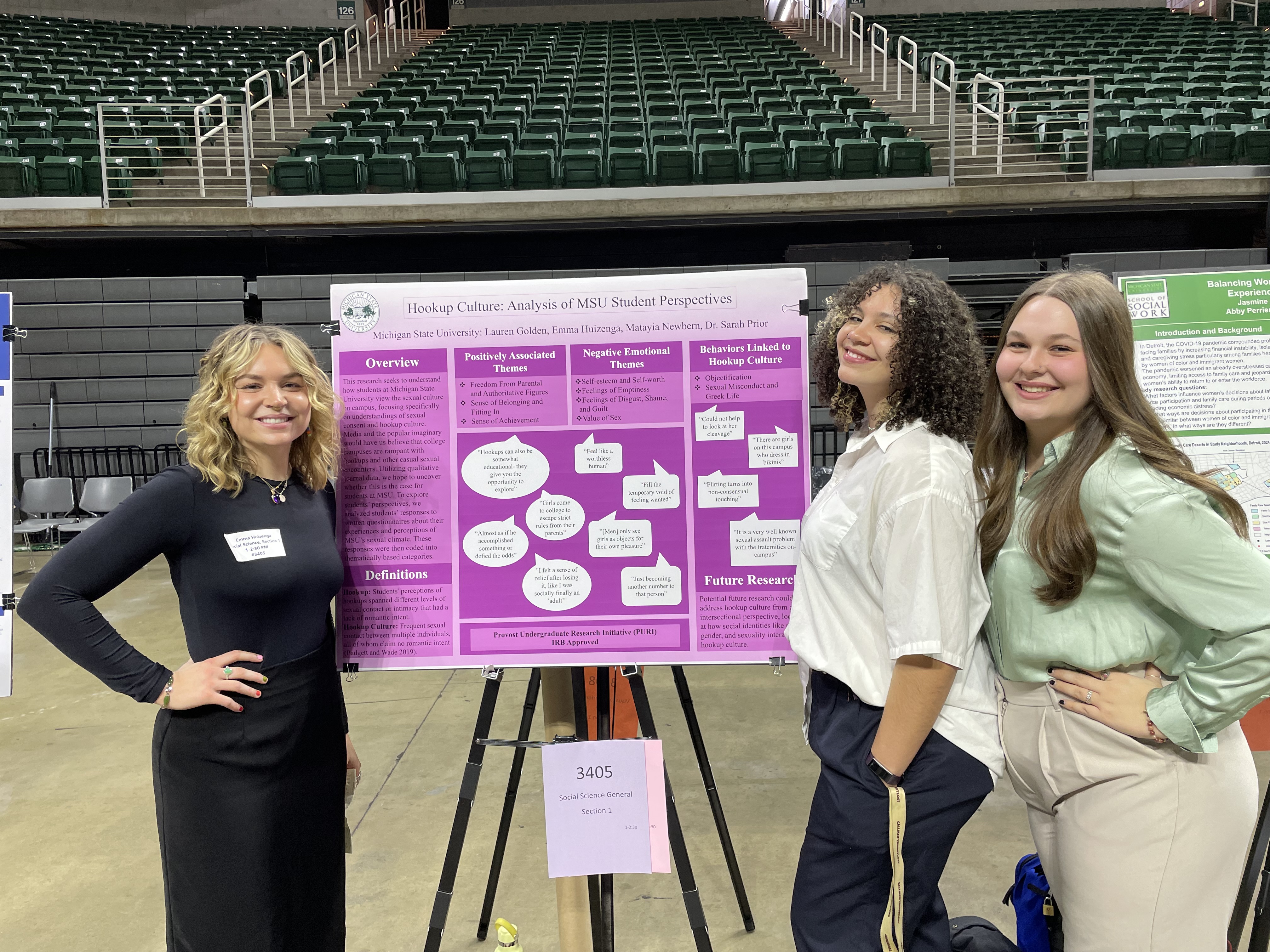About Sociology
Find Your Life's Mission in MSU Sociology!
Sociology is the study of human society. Sociology asks these questions: How is society shaping us? How are we shaping society? Considering social phenomena from a sociological perspective can be a tremendous asset to one's academic and professional career. Students who study sociology will gain insights on topics ranging from the development of the self (how did you become who you are?), to the functioning of large institutions like religion (why do you believe what you believe?) and health care (how does our society take care of the sick?). They will be exposed to the experiences of immigrants in a new country, as well as the development and dissemination of movies and music. As budding sociologists, students in the Department of Sociology at MSU will seek and find ways to explain the complex and fascinating links between individuals and the groups, organizations, communities, and societies in which we live and function. At MSU, we emphasize areas such as environmental sociology, the sociology of health and medicine (including the study of mental health), the study of sex and gender, the relationships between animals and human society, and others.
Meet the Undergraduate Program Director
 Dr. Sarah Prior is the Undergraduate Program Director for the Department of Sociology. She works to improve the undergraduate curriculum and learning experiences for all our undergraduate students. She can be reached at priorsar@msu.edu.
Dr. Sarah Prior is the Undergraduate Program Director for the Department of Sociology. She works to improve the undergraduate curriculum and learning experiences for all our undergraduate students. She can be reached at priorsar@msu.edu.
F.A.Q.
-
What is sociology?
Sociology is the scientific study of societies, how they are organized, and how they change. Sociologists attempt to explain patterns of collective social behaviors of groups and societies.Using scientific methods we conduct research to suggest possible problem-solving strategies for society’s problems. We develop theories about societies, communities, institutions, bureaucracies, small groups, personal identities, relationships and interpersonal relations, social movements, collective behavior, social classes, social conflict, and more. In a practical sense, sociology is many different things for undergraduates: a pathway to a job; a way to learn about society or some parts of it such as cities, families, or organizations; knowledge about social problems and how to solve them; skills that will be useful to a lawyer, counselor, urban planner, social worker, police administrator, gerontologist, teacher, community organizer, or other professional.
Yet what sociology can be for you personally is something you can have the fun of discovering and creating for yourself. For example, why do people migrate? What are society’s health, food, and social problems? Why and how do people develop personal identities? How does culture influence thinking and behavior? Sociology is an open discipline with opportunities for many people with varied interests. It can be a highly stimulating undergraduate major as well as a stepping stone to graduate school and a wide variety of careers.
As a generalizable social science discipline, sociology provides an excellent background for students who have the required ability and interest to continue their education at the graduate level in any of the social science disciplines, or in related disciplines (such as Economics or Communications). At MSU, Sociology is a department in the College of Social Science. Other disciplinary departments in the College of Social Science are Anthropology, Economics, Human Development and Family Studies, Geography, History, Political Science, and Psychology. In addition, the College of Social Science also includes professional schools of Social Work, Criminal Justice and Labor and Industrial Relations (graduate work only), and a professional program of Urban and Regional Planning. Finally, the College of Social Science provides a major in Interdisciplinary Studies, which combine the use of several of the six Social Science disciplines.
-
What careers are available for sociology majors?
Given the breadth, adaptability, and utility of Sociology, employment opportunities abound for BA graduates. You can secure entry level positions in many of the areas previously mentioned in defining the scope of sociology. The following is just a list of examples—many other paths may be open to you. Employment sectors include:
- social services—in rehabilitation, case management, group work with youth or the elderly, recreation, or administration
- community work—in fund-raising for social service organizations, nonprofits, child-care or community development agencies, or environmental groups
- corrections—in probation, parole, or other criminal justice work
- business—in advertising, marketing and consumer research, insurance, real estate, personnel work, training, or sales
- college settings—in admissions, alumni relations, or placement offices
- health services—in family planning, substance abuse, rehabilitation counseling, health planning, hospital admissions, and insurance companies
- publishing, journalism, and public relations—in writing, research, and editing
- government services—in federal, state, and local government jobs in such areas as transportation, housing, agriculture, and labor
- teaching—in elementary and secondary schools, in conjunction with appropriate teacher certification, as well as in higher education such as colleges and universities (with a terminal degree).
Obtaining work experience before applying to graduate school might improve your chances of acceptance and make further education more meaningful. An entry level job might also help you sharpen your interests and decide future directions—continuing to climb the career ladder, changing fields, or furthering your education.
-
What is the liberal arts advantage?
A bachelor’s degree in sociology provides an excellent liberal arts foundation for embarking on the wide range of career paths that many liberal arts majors pursue. Undergraduate training in sociology can open a variety of doors in business and the human services. Sociology majors who enter the business world work in sales, marketing, customer relations, or human resources. Those who enter human services work with youths at risk, the elderly, or people experiencing problems related to poverty, substance abuse, or the justice system.
When we ask sociology majors who are already employed outside academic settings to reflect on their education with the wisdom of hindsight, they value most highly their undergraduate courses in social research methods, statistics, and computer skills. These courses help make BA undergraduates marketable, especially in today’s highly technical and data-oriented work environment. In addition, sociology majors develop analytical skills and the ability to understand issues within a “macro” or social structural perspective. Learning the process of critical thinking and how to bring evidence to bear in support of an argument is extremely important in a fast-changing job market.
Consequently, with a BA in sociology, there is a competitive advantage in today’s information society. The solid base you receive in understanding social change—as well as in research design, data analysis, statistics, theory, and sociological concepts—enables you to compete for support positions (such as program, administrative, or research assistant) in research, policy analysis, program evaluation, and countless other social science endeavors.
The well-educated sociology BA graduate acquires a sense of history, an understanding of other cultures and times; the interconnectedness of social life; and different frameworks of thought. Proficiency is gained at gathering information and putting it into perspective. Sociological training helps students bring breadth and depth of understanding to the workplace. A sociology graduate learns to think abstractly, formulate problems, ask appropriate questions, search for answers, analyze situations and data, organize material, write well, and make oral presentations that help others develop insight and make decisions. Sociology BA graduates have an advantage in understanding human behavior on three levels:
- how individuals behave in organizations, families, and communities
- the ways in which these social units function as groups
- the wider social, political, and economic contexts in which decisions are made and in which groups function, including race, sex, and social class.
-
How can I link sociology to other majors and minors?
The power of a sociology major is amplied when taking a multidisciplinary approach. Employment analysts predict that the most successful people in the 21st century will be those who have been exposed to a wide variety of disciplines and have taken the time to study in some depth outside their field.
You can begin the process of multiplying your perspectives as an undergraduate major in sociology by planning a double major with an area such as criminal justice, economics, English, anthropology, a second language, political science, or education. Or, you can take a minor or concentration in computer science, business management, marketing, human services, law and society, social work, or pre-law—just to name a few possibilities. Work with your advisor to develop an integrated set of courses that will provide depth in one or more areas.
-
What value is there with completing an internship or service learning project?
Internships during or just after the undergraduate years offer invaluable experience that can bring to life the sociological concepts and theories studied in books and in the classroom. You can sample potential careers, build your resume, and learn new skills during a well-chosen internship experience. Participation in an internship affords an excellent way to explore career options and help determine what aspects of sociology interest you the most.
A wide range of internships is available to sociology graduates. Whether you enjoy working with families or learning more about statistical methods to track population growth, you can find an organization that will give you the opportunity to gain experience while you work toward the goals of the organization. Many agencies and institutions offer internships, and many colleges will provide college credits for internship experience. While some internships provide remuneration, many are unpaid. Remember that an internship will help pave the way to subsequent employment opportunities, so working without pay may well be worth your investment of time and energy in the long run. Data show that sociology students who take part in internships find it much easier to find employment later.
Courses that include service learning – volunteer work that is connected to the course topic – are also valuable for career testing and practical experience in applying sociological concepts, methods, and theories.


